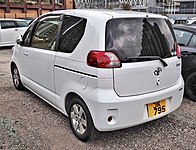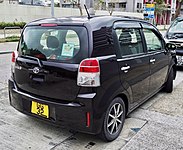| Toyota Porte | |
|---|---|
 2012 Toyota Porte | |
| Overview | |
| Manufacturer | Toyota |
| Also called | Toyota Spade (2012–2020) |
| Production | July 2004 – December 2020[1][2] |
| Body and chassis | |
| Class | Mini MPV |
| Layout | |
The Toyota Porte (Japanese: トヨタ・ポルテ, Hepburn: Toyota Porute) is a mini MPV produced by the Japanese automaker Toyota from 2004 to 2020 that features an electric-powered sliding door on the passenger side, similar in approach to the Isis. The driver's door is of the conventional swing-open type.
First generation (AP10; 2004)
[edit]| First generation | |
|---|---|
 | |
| Overview | |
| Model code | AP10 |
| Production | July 2004 – July 2012 |
| Assembly | Japan: Ōyamazaki, Kyoto (Daihatsu)[3][4] |
| Body and chassis | |
| Body style | 3-door hatchback |
| Platform | Toyota NBC platform |
| Related | |
| Powertrain | |
| Engine | |
| Transmission | 4-speed automatic |
| Dimensions | |
| Wheelbase | 2,600 mm (102.4 in) |
| Length | 3,990 mm (157.1 in) |
| Width | 1,690 mm (66.5 in) |
| Height | 1,720 mm (67.7 in) |
| Curb weight | 1,090–1,200 kg (2,403–2,646 lb) |
The Porte was introduced in July 2004, but is only available in Japan, so it is only produced with right-hand drive. The Porte is based on the first generation Vitz subcompact car and is made in 4-seater and 5-seater versions.
It comes with either a 1.3-litre or 1.5-litre gasoline engine, with automatic transmission only, and with either front-wheel drive or four-wheel drive. It is similar in concept to the 2002 Peugeot Sesame and the slightly smaller Peugeot 1007 which has an electric-powered sliding door on both sides. However the door only slides on the left.
-
Rear view
Second generation (XP140; 2012)
[edit]| Second generation | |
|---|---|
 | |
| Overview | |
| Model code | XP140 |
| Also called | Toyota Spade |
| Production | July 2012 – December 2020 |
| Assembly | Japan: Susono, Shizuoka (Toyota Motor East Japan)[3] |
| Body and chassis | |
| Body style | 4-door hatchback |
| Platform | Toyota B platform |
| Related | |
| Powertrain | |
| Engine | |
| Transmission | CVT |
| Dimensions | |
| Wheelbase | 2,600 mm (102.4 in) |
| Length | 3,995 mm (157.3 in) |
| Width | 1,695 mm (66.7 in) |
| Height |
|
| Curb weight | 1,100–1,240 kg (2,425–2,734 lb) |
| Chronology | |
| Predecessor | Toyota Raum (Spade) |
In July 2012, the Porte was redesigned and for this generation, it introduced the Toyota Spade (Japanese: トヨタ・スペイド, Hepburn: Toyota Supeido) twin model, which sported a different front and rear design, as well as a slightly different interior colour. The second generation Porte is sold at Toyota Store and Toyopet Store dealerships while the Spade is sold at Corolla Store and Netz dealerships across Japan, as well as Hong Kong and Macau, starting in August 2015.
Although, it still comes with the 1.3-litre 1NR-FE engine or an improved 1.5-litre 1NZ-FE engine, mated with the Super CVT-i (Continuously Variable Transmission-intelligent) automatic transmission, an available Smart Stop feature for the 1.5-litre variants has a fuel efficiency of 20.6 km/L (58 mpg‑imp; 48 mpg‑US) under the JC08 test cycle (equivalent to 113 g/km (6.4 oz/mi) of CO2 emissions) of the Japanese Ministry of Land, Infrastructure, Transport and Tourism (MLIT).[5] The two different engine sizes gave Japanese drivers a choice as to which annual road tax obligation they were willing to pay; vehicles with the larger engine were equipped at a higher level than the lower trim level in compensation.
In July 2015, the 1.3-litre engine option was dropped and a newer 1.5-litre 2NR-FKE engine was used for front-wheel drive models. This version has a fuel efficiency of 22.2 km/L (63 mpg‑imp; 52 mpg‑US) under the JC08 test cycle.[6]
Toyota stopped the production of the Porte and Spade in December 2020.[1][2]
-
Rear view
-
Passenger side, with single sliding door
-
Toyota Spade
-
Toyota Spade
-
Interior
Sales
[edit]| Year | Japan[7][8] | |
|---|---|---|
| Porte | Spade | |
| 2004 | 34,867 | |
| 2005 | 45,470 | |
| 2006 | 39,935 | |
| 2007 | 36,777 | |
| 2008 | 32,961 | |
| 2009 | 24,483 | |
| 2010 | 18,582 | |
| 2011 | 12,810 | |
| 2012 | 25,752 | 26,539 |
| 2013 | 31,649 | 48,584 |
| 2014 | 26,648 | 38,733 |
| 2015 | 21,006 | 28,809 |
| 2016 | 16,687 | 19,954 |
| 2017 | 8,808 | 8,215 |
| 2018 | 6,205 | 4,552 |
| 2019 | 5,037 | 3,047 |
| 2020 | 3,732 | 1,886 |
| 2021 | 46 | 7 |
References
[edit]- ^ a b "トヨタ、「プリウスα」「プレミオ」など5車種を生産終了" [Toyota discontinues production of 5 models including "Prius α" and "Premio"]. ITmedia (in Japanese). Japan. 2020-12-02. Retrieved 2022-01-04.
- ^ a b "トヨタ自動車、プレミオ、プリウスα など5車種の生産終了を発表" [Announced the end of production of 5 models including Toyota Motor, Premio, Prius α]. Response (in Japanese). Japan. 2020-12-03. Retrieved 2022-01-04.
- ^ a b Brooks, Glenn (2013-03-01). "Getting back on top". Automotivemanufacturingsolutions.com. Retrieved 2018-07-04.
- ^ "75 Years of TOYOTA | General Status of Plants in Japan | Affiliates (Toyota wholly-owned subsidiaries)-Affiliates (other vehicle assembly cos.)". Japan: Toyota. 2012. Retrieved 2020-11-13.
- ^ "TMC Launches Redesigned 'Porte' and New 'Spade' Compact Minivans in Japan" (Press release). Japan: Toyota. 2012-07-23. Retrieved 2016-01-02.
- ^ "トヨタ スペイド | 燃費・走行性能 | 走行性能" [Toyota spade | fuel efficiency and driving performance | driving performance] (in Japanese). Japan: Toyota. 2015. Retrieved 2016-01-02.
- ^ "トヨタ ポルテ 新車販売台数推移/売れ行きと生産状況は? - 株式会社アイディーインフォメーション" [Toyota Porte new car sales trends/sales and production status?]. id-information.co.jp (in Japanese). Retrieved 2024-04-21.
- ^ "トヨタ スペイド 新車販売台数推移/売れ行きと生産状況は? - 株式会社アイディーインフォメーション" [Toyota Spade new car sales trends/sales and production status?]. id-information.co.jp (in Japanese). Retrieved 2024-04-21.
External links
[edit]- Official website (Porte)
- Official website (Spade)





